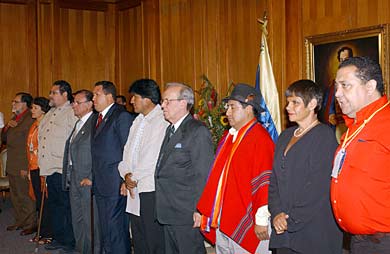The 2nd Bolivarian Congress of Peoples that brought together more than 200 political and social leaders from across Latin America and the Caribbean closed in Venezuela with a commitment by President Hugo Chavez to continue the slow process of creating a community of South American nations.

“We have declared our will to create the community of South American nations, it is an important step. It does not matter that we advance one millimetre along the path, as long as we are headed in the correct direction, because we can travel as fast as if we were on a plane along the an incorrect course. Let’s keep the compass, the road, and the map clear and let’s advance against strong winds and tides. Sometimes the wind is very strong and we cannot advance, sometimes it’s one step back, but that is the direction. It does not matter how long it takes us. We took one step towards the direction, the correct direction,” Chavez said, referring to a conference of Latin American presidents he attended in Peru this week.
“They will not be able to take us, united as we are,” Chavez said, “we have an ideological project, we have a strategy and one thousand tactics, one thousand plans to go on the offensive. There will be no one who can stop this revolutionary movement throughout all of these lands,” Chavez said.
The President of Venezuela said that the Bolivarian congress should provide structure for the international movement towards South American integration. “This is urgent because the aggression that Cuba has been resisting for more than 40 years and continues to resist, with an increasing threat there, which will equally be launched, the threats and the aggressions, against any government or any country that strays from the empire,” Chavez said.
Chavez announced that he will be travelling this Sunday to the Municipality of Sandino in Cuba, a zone most affected by Hurricane Charley. The President will be visiting the Venezuelan military unit sent to the Caribbean country to help rebuild homes damaged or destroyed by the hurricane. “This is ALBA (Venezuela’s alternative to the FTAA) at work, it is an example of how two peoples integrate to battle against thousands of difficulties. We are doing the same in Jamaica and in Grenada, a new model of integration,” Chavez said.
Marcia Campos, the President of the Democratic Federation of Women, read the Caracas Proclamation that summarized the desire of the people of Latin America and the Caribbean to struggle together towards independence based on social justice and to create “humanist models of development and alternatives to neo-liberal capitalist policies”.
The delegates gathered at the Bolivarian congress denounced the Bush administration that they say violates international and humanitarian rights. The delegates supported the creation of the Community of South American Nations as well as a Latin American bank of indigenous seeds. They also proposed a Latin American organization of workers.
Leaders from Argentina and Ecuador supported the ideas for South American unification as expressed by Simon Bolivar, San Martin and most recently by the President of Venezuela. “The victory of Hugo Chavez does not only signify a victory for Venezuela, but for all of Latin America, for the peoples that are struggling day in and day out to improve the conditions of the lives our people, where the policies of North America have been imposed in all countries (in South America),” Gilberto Talagua said, leader of the Pachakutik movement in Ecuador.

Evo Morales y Petroamérica
Evo Morales, indigenous Bolivian leader and next presidential hopeful in the Andean country said that Petroamerica, a South American continental energy company, is central to the dream of a Community of South American nations.
Morales said that the economic base of the new community should be natural resources but not in the hands of multinational corporations, but rather shared through Pertroamerica by associate countries like Bolivia and China.
“We dream that Petroamerica can be consolidated, I hope I am not mistaken. I think that if we speak of partners, why can’t Petroamerica have partners like China and Bolivia to stop the North American empire. It’s important to advance these economic proposals to liberate our peoples,” Morales said.
“Enough of foreign people who come to dominate us, and to subject us and make themselves the owners of our lands,” concluded Morales.
 Articles by this author
Articles by this author











Stay In Touch
Follow us on social networks
Subscribe to weekly newsletter